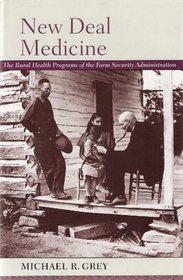Search -
New Deal Medicine: The Rural Health Programs of the Farm Security Administration
New Deal Medicine The Rural Health Programs of the Farm Security Administration
Author:
The New Deal's most significant involvement in health care delivery has had effects still felt today. The Farm Security Administration was one of several New Deal agencies whose collective purpose was to provide for Americans left indigent by the massive economic collapse of the 1930s. The agency helped low-income farmers, sharecroppers, and ... more »
Author:
The New Deal's most significant involvement in health care delivery has had effects still felt today. The Farm Security Administration was one of several New Deal agencies whose collective purpose was to provide for Americans left indigent by the massive economic collapse of the 1930s. The agency helped low-income farmers, sharecroppers, and ... more »
ISBN-13: 9780801859397
ISBN-10: 0801859395
Publication Date: 1/21/1999
Pages: 264
Edition: 1
Rating: ?
ISBN-10: 0801859395
Publication Date: 1/21/1999
Pages: 264
Edition: 1
Rating: ?
0 stars, based on 0 rating
Publisher: The Johns Hopkins University Press
Book Type: Hardcover
Members Wishing: 1
Reviews: Amazon | Write a Review
Book Type: Hardcover
Members Wishing: 1
Reviews: Amazon | Write a Review
Genres:
- Nonfiction >> Current Events >> Poverty >> Social Services & Welfare
- Medical Books >> Administration & Medicine Economics >> Health Care Delivery
- Medical Books >> Administration & Medicine Economics >> Health Risk Assessment
- Medical Books >> Dentistry >> Preventive




